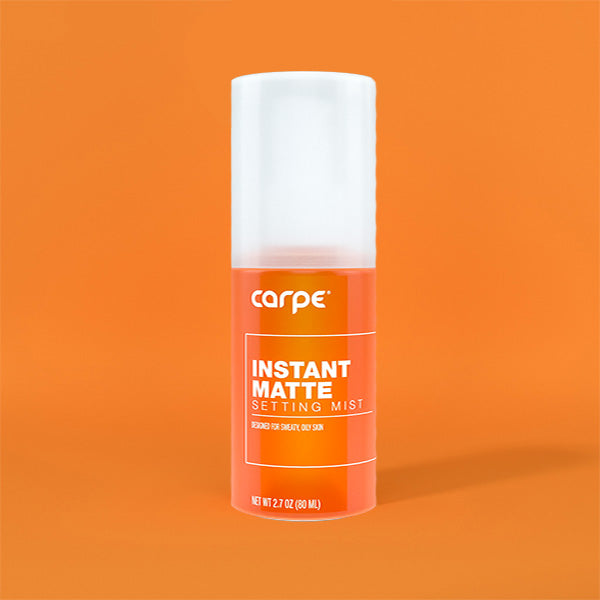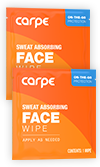Football season is finally rolling around as the weather cools off, but some players struggle with sweat problems as the season heats up. Athletes are known to sweat copiously when they are performing - it is a sign of health as it is the body’s only physiological adaptation to keep itself cool. In fact, those who are more fit tend to sweat more than those who are not because they can workout at a greater workload which generates more heat. However, at a certain point sweating can become an issue for athletes trying to perform at an optimal level.[1] This is true for athletes in all types of sports, but it can be especially pertinent to football players as they participate in such a high impact sport and come in such varied shapes and sizes. One study found that linebackers tend to sweat more, on average, than other types of players due to the size of their bodies. Their overall larger size caused them to generate more heat while working out and thus produce more sweat[2] While a linebacker producing more sweat than a smaller player is normal and makes sense, some players make such large quantities of sweat that it interferes with their performance.
So, how much sweat is too much? There is a large natural variation in the amount of sweat physiologically normal people produce. One person can produce twice as much sweat as another and still be within the normal range. However, some people sweat so much that it indicates that they may have a condition called primary focal hyperhidrosis. Hyperhidrosis is a condition that causes people to sweat in excess of what the body needs to maintain its internal temperature. People with the condition may sweat four to five times as much as a normal person. Hyperhidrosis usually causes excessive sweating to happen on specific parts of the body like the hands, feet, armpits, face, and occasionally the back and groin. It is not a dangerous condition, but it can have damaging consequences for football players who have it. It affects around 3% of the population so it is not uncommon. If you have the following symptoms you may be struggling with hyperhidrosis:
You sweat excessively even in cool conditions when you aren’t working out
You sweat from specific areas of your body like the hands, feet, armpits, or face
The amount of sweat you produce causes you to have functional issues when you are trying to play football[3]
If sweat is interfering with your ability to play football then check out these tips to get your sweating under control and your focus back in the game.
#1 Wear the Right Gear
As many athletes know, it is imperative to wear the right type of clothing when performing. This is also the case when it comes to protecting yourself from sweat. If you have hyperhidrosis, or even if you just sweat a lot, wearing the right clothing during a workout session can protect you from chafing, skin breakdown, and irritation.[4] The most important clothes for people who sweat excessively are underwear and socks.This is because they are the clothes that will come in contact with your sweat the most. The best type of underwear tend to be manufactured by athletic brands. It is best to go with underwear that is made from new types of fabrics that have moisture wicking technology. This advice holds up for athletic socks as well. These materials will keep sweat away from your skin and keep it dryer for longer.
When buying clothes to workout in try and find shirts and pants made out of natural, lightweight fibers - like cotton. These types of fabrics are breathable and absorbent allow sweat to transfer away from the skin. You may not have as much choice of what to wear when you are in an actual game, but keeping your skin safe during practices can ensure that you are ready to perform on days when you have less control over your wardrobe.
You may also want to try:
Wearing a headband if you struggle with sweat dripping and burning your face.
Use gloves to prevent slippage when throwing and catching the ball.
Wear extra padding under your uniform if you are worried about sweat leaking through to the outside.
#2 Use Antiperspirant and Powder to Improve Grip
Antiperspirant is a must have for anyone with excessive sweating, especially athletes. Antiperspirant allows skin to produce less sweat by forming a superficial plug within sweat glands.You can use antiperspirant on specific problem areas of your body which makes it even more ideal for athletes. For example, if you are struggling with your grip on the ball you can apply antiperspirant to your hands so you won’t sweat as much from them. This way it won’t affect the rest of your body. Antiperspirant is the first line treatment doctors recommend for hyperhidrosis because it works locally and it is considered to be very effective.[5] Powders, like baby powder, can also be useful to keep your hands and feet from slipping when you have extra sweat. They can be applied before practice or a game and have virtually no side effects. You can find over-the-counter topical treatments for hyperhidrosis, like antiperspirants and powders, at your local pharmacy or grocery store. There are several types and brands to choose from. Some brands, like Carpe, have antiperspirant lotion that is useful for sensitive skin. The same brand make a groin powder to help cut down on chafing and discomfort. Other brands offer antiperspirants that come in spray, roll on, and stick forms. It is important to read labels and stay informed so you can choose the right antiperspirant for you.
#3 Protect Yourself from Jock Itch
ock itch, as the name implies, is a common ailment for male athletes. It is a type of fungal infection that is medically referred to as tinea cruris. It is caused by a type of fungus called ringworm and it thrives on warm moist areas of the body. It can be a common problem for people who deal with excessive sweating on a regular basis, especially athletes. You may have ringworm if you are experiencing the following around the area of the groin:
Itching and burning
Red, scaly rash with raised edges
Cracking, flaking, or peeling skin[6]
If you suspect that you have jock itch then you need to treat it. Most cases can be resolved fairly easily with an over-the-counter antifungal. It is easy to prevent jock itch by doing the following:
Showering frequently, especially after sweating
Don’t share your personal items like towels with others
Wear clean clothes and change after a workout
Wear loose fitting clothes and switch to boxers if you have an ongoing problem[6]
#4 Check Your Anxiety Levels for Better Performance
Hyperhidrosis and anxiety are closely related as anxiety can be a result of the condition and it can also make it worse. This can be especially pertinent for football players as performance anxiety prior to games can make sweating worse which can, in turn, affect performance. If you are dealing with anxiety try to find ways to relax so that you focus on your game and not on your sweat. There are some relaxation techniques like meditation, biofeedback, hypnosis, and yoga that have been shown to reduce stress, and in some cases, reduce sweating.[7] Working on your anxiety will help you focus better on football, improve your skills, and reduce your sweating. If anxiety is a big problem for you then talking to a doctor can help.
#5 Stay Clean
This may seem obvious, but it is imperative that athletes who have been sweating profusely shower after every workout. This won’t reduce the amount you sweat, but it will improve other associated problems. It is a good idea to shower and use antibacterial soap, especially after touching equipment used by many other people. This is prevent bacteria on the surface of your skin from breaking down sweat and producing foul smelling byproducts and it will reduce your chance of catching fungal and bacterial infections. When you sweat often it is important to prevent skin breakdown and staying clean is necessary for that. It is also a good idea to change into clean clothes after every workout. If you decide to apply antiperspirant it is best to do so later in the day after a shower when your skin is dry.[8]
If these tips aren’t cutting it and you are still struggling with sweat, then it may be time to see a doctor. There are several effective treatments available for people with hyperhidrosis and they can improve your ability to play football as well as your quality of life if you need them. Don't give up and give it your best this season!
Sources
- Heid, M. (2015, July 8). You Asked: Is It Healthy to Sweat A Lot? Time. Retrieved from https://time.com/3947804/sweating-healthy/
- Godek, S. F., Bartolozzi, A. R., Burkholder, R. B., Sugarman, E., & Peduzzi, C. (2008). Sweat Rates and Fluid Turnover in Professional Football Players: A Comparison of National Football League Linemen and Backs. Journal of Athletic Training, 184–189. Retrieved from https://www.ncbi.nlm.nih.gov/pmc/articles/PMC2267333/
- Doheny, K. (n.d.). How Much Sweating Is Too Much? Retrieved from https://www.webmd.com/skin-problems-and-treatments/features/dont-sweat-it#1
- Doheny, K. (n.d.). When You Sweat Too Much. Retrieved from https://www.webmd.com/skin-problems-and-treatments/features/dont-sweat-it#1
- Pariser, D. M. (2014). Hyperhidrosis (4th ed., Vol. 32). Philadelphia, PA: Elsevier.
- What Causes Jock Itch? Can You Prevent It? (2019, May 15). Retrieved from https://www.webmd.com/men/causes-and-prevent-jock-itch#1
- Shenefelt, P. D. (2017). Use of Hypnosis, Meditation, and Biofeedback in Dermatology. Clinics in Dermatology. doi:10.1016/J.clindermatol.2017.01.007
- Excessive Sweating: Treatment Tips. (2017, October 21). Retrieved from https://www.webmd.com/skin-problems-and-treatments/hyperhidrosis-treatment-11#1






16790753702383.jpg?v=1679075372)

16790746985853.jpg?v=1679074700)


16790757289763.jpg?v=1679075731)










